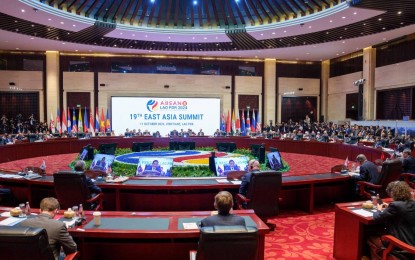
OPENNESS. President Ferdinand R. Marcos Jr. stresses the need for openness and cooperation among claimant states to manage tensions in the South China Sea during his intervention at the 19th East Asia Summit in Vientiane, Laos on Friday (Oct. 11, 2024). He said concerted and serious efforts are necessary to manage ongoing disputes. (Photo courtesy of Presidential Communications Office)
MANILA – President Ferdinand R. Marcos Jr. on Friday stressed the need for openness and cooperation among claimant states to manage tensions in the South China Sea (SCS).
In his intervention at the 19th East Asia Summit (EAS) in Vientiane, Laos, Marcos noted that overall tensions in the contested waters persist and remain a "strategic challenge that cannot be readily solved" for the concerned parties.
“Though positive developments have occurred recently in my country, it is regrettable that it has not changed the overall situation in the South China Sea, tensions remain,” Marcos said.
He said concerted and serious efforts are necessary to manage the ongoing disputes.
“Parties have to be conscientious and earnest concerning this most consequential issue. We must all remain open so as to seriously manage differences and reduce tensions,” Marcos said.
"These kinds of behavior cannot be ignored and demand of us concerted and serious efforts to truly manage our disputes in the South China Sea," he added.
The President particularly cited the August harassment of Philippine vessels by Chinese maritime assets.
Chinese vessels harassed the Philippine Coast Guard while on routine maritime patrol in Escoda Shoal, which is within the exclusive economic zone of the Philippines.
He also mentioned a more recent incident, wherein People’s Liberation Army Navy missile ships intimidated Philippine civilian fishing vessels and aircraft, showing China’s continued disregard for international law and standards, particularly the United Nations Convention on the Law of the Sea (UNCLOS) and the 1972 Convention on the International Regulations for Preventing Collisions at Sea.
The President reiterated the need for the swift conclusion of a binding ASEAN-China Code of Conduct to mitigate risks of miscalculation and potential escalation in the vital waterway.
He further suggested the inclusion in EAS initiatives of the South China Sea-related issues, such as enhancing maritime domain awareness, improving marine environmental protection, and establishing clear rules of engagement for vessels plying the South China Sea.
He said multilateralism can only thrive based on a rules-based international order anchored on the purposes and principles of the UN Charter and international law.
Sovereignty, territorial integrity, and political independence of all states, and peaceful settlement of disputes, could only be achieved through the preservation of this order, providing the greatest assurance of peace for the current and future generations, Marcos added.
The 18 participating countries of the EAS are the 10 ASEAN member states (Brunei, Cambodia, Indonesia, Laos, Malaysia, Myanmar, the Philippines, Singapore, Thailand and Vietnam), Australia, China, India, Japan, New Zealand, Republic of Korea, Russia, and the United States. (PNA)
